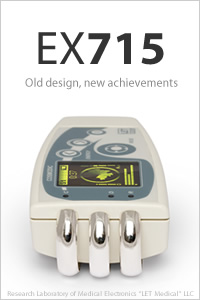I. P. Komarova, N. S. Ryazanov
SCENAR-therapy with model 035-4
Clinical examples of SCENAR-therapy with SCENAR series model 035-4
1. |
Patient A. I., female of 51. Diagnosis: hemorrhoids accompanied by constant constipations, during 20 years. Exacerbation stage. Inflammation of hemorrhoids, with anal fissures. Three sessions of SCENAR-therapy resulted in complete recovery, normal stools, no constipations. Remission period — 2 years.
|
2. |
Patient A. I., female of 49. Menopause for 3 years. Diagnosis: fibromyoma of uterus of 7–8 weeks size, with monthly bleeding. The patient was conducted 15 sessions of SCENAR-therapy with a day interval using usual methods. Bleeding was eliminated after the first few sessions. Control examination 4 months after SCENAR-therapy revealed decrease of myoma to 4–5 weeks size. The patient was again observed a year later. No bleedings.
|
3. |
Patient E. M., female of 80, creative worker — restorer. Diagnosis: arthritis of the right hip joint in acute condition. Anamnesis — 6 years. Exacerbation of the disease was lingering, the patient experienced pains during 6 months, suffered from insomnia, was unable to work and move. Undergone treatment in three medical institutions of St. Petersburg. Traditional conservative methods of treatment produced neither positive effect nor pain relief. After the first session of SCENAR-therapy pains disturbing the patient at night (in resting condition) were eliminated. Pains after physical loads were being eliminated with every next session. After 17 sessions of SCENAR-therapy the pains were eliminated completely. The patient recovered her working ability and could move without problem. Remission period — 6 months.
|
4. |
Patient E. P., female of 70. Diagnosis: nontoxic goiter (for 1 year). Greatly enlarged thyroid gland. Medical professionals strongly recommended undergoing surgical operations. The patient was conducted 15 sessions of SCENAR-therapy with 1-2-3 days intervals. Enlargement of the thyroid gland was eliminated. Remission period made up 4 months.
|
5. |
Patient A. B., female of 35. Diagnosis: functional disorder of the nervous system. The patient's condition was characterized by breakdown, pronounced sleepiness in the daytime, hypotention. The patient was in such condition for 2 months. Five sessions of SCENAR-therapy using the “three tracks” method (see below) resulted in complete recovery. Remission period made up 1 year.
|
6. |
Patient V. O., female of 57. Diagnosis: condition after uterus extirpation, commissure disease. During 1.5 years the patient suffered from constant pains in the region of the non-healing post-operative scar. The patient was conducted five sessions of SCENAR-therapy. The first session significantly relieved pains. Further observation of the patient has been stopped due to relocation.
|
7. |
Patient V. K., female of 32, nursing mother. Diagnosis: lactostasis. Fever during two days, temperature up to 40–41°C, severe pains in the right breast. Two sessions of SCENAR-therapy with 7-hour interval eliminated pain and fever condition, temperature became normal two hours after the second session. The patient could sleep well at night. Methods used: local treatment of the right breast and face.
|
8. |
Patient S. N., male of 38. Diagnosis: unceasing hiccup. Hiccup condition occurred in post-operative period. The patient had been operated on his right lower extremity. The patient was conducted two sessions of 3 minutes each with 5-hour interval. (Once the hiccup disappeared right after treatment of the paravertebral region at the level of the thoracic vertebral section.) After supper hiccup occurred again. Treatment of the same area for the second time eliminated hiccup completely.
|
9. |
Patient E. S., male of 53. Diagnosis: right-sided facial neuritis (for 30 years). Exacerbation of this condition occurred 2 or 4 times a year. During a remission period the patient was conducted 12 sessions of SCENAR-therapy using “three tracks” method and local treatment of the face in accordance with “symmetry” method. During a period of 1.5 years no exacerbations were observed.
|
This method of treatment is also effective for functional disorders with insignificant organic changes. SCENAR-therapy is most effective for such symptoms and diseases as chill, fever, headache, heavy sensations in head, vertigo, noise in the ears, slow-moving or induration of joints and extremities, languor, cold extremities, insomnia, deformation of the vertebral column, pains in the back, forearms and hands, constipation, anemia, neuralgia, etc. The list of diseases and pathological conditions which can be successfully treated by SCENAR-therapy is rather long.
Most effectively treated by SCENAR-therapy disorders are as follows:
- nervous system (osteochondrosis, neuralgia, neuritis, disorders of cerebral circulation, disorder of the central and vegetative nervous systems);
- musculoskeletal system (myositis, arthritis/arthrosis, bruise of soft tissues, fracture);
- respiratory system (tracheitis, bronchitis, acute respiratory disease, acute respiratory viral disease, pneumonia, pleurisy, bronchial asthma);
- cardiovascular system (ischemic heart disease, hypertension, hypotension, various forms of arrhythmia);
- extremity vessels (microcirculation disorders, trophic ulcers, varicosis);
- digestive system (peptic ulcer, gastritis, enteritis, colitis, cholecystitis, cholelithiasis — pain-free elimination of stones);
- urogenital system (enuresis, prostatitis, pyelonephritis, cystitis, urolithiasis - reducing stones to sand size and further elimination);
- female reproductive system (inflammatory diseases, sterility, disorder of ovarian functioning, benign tumour).
Effects produced:
Analgetic, anti-inflammatory, restoring functions of the body, improving blood circulation, normalizing metabolism, eliminating edema, quicker wound healing, significantly improving general well-being. These effects usually occur after the first sessions of SCENAR-therapy. The acuter the patient's condition, the more pronounced therapeutic effect.
Contra-indications:
- artificial cardiostimulator;
- severe mental diseases;
- implanted ampoules with contraceptives;
- acute infectious diseases of unknown etiology;
- individual intolerance.
|




